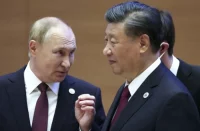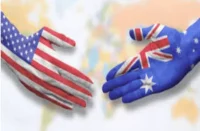Everything about North Korea has to be speculative. That has been and is still the main problem. But one speculation seems to be ending, finally. It concerns China’s apparent ambivalence about North Korea’s nuclear program. Increasingly, Beijing is coming out on the ‘right side of history’.
Which in turn would unleash a host of profound consequences for the security of the Asia-Pacific and global politics as a whole, and, most important, for the future of what China’s new leader Xi Jinping enigmatically alluded to – but left undefined – as his “two great powers” concept during his visit to the United States last year when he was still a mere ‘princeling’.
Indeed, as the ‘breaking news’ accrued out of the bits and pieces of information of an obscure earthquake in North Korea early on Tuesday and it dawned on the world that the hermit kingdom has probably conducted its third underground nuclear test, all eyes began turning to China. For China watchers on the whole this is a veritable feast for the mind – how the new leadership in China would cope with a major foreign policy challenge – the second challenge simultaneously, in fact, if one were to add the feud between China and Japan over the disputed islands in the East China Sea.
At the end of the day, it transpires that Xi’s predecessor Hu Jintao kept voicing counsels of reason to Pyongyang but also kept the North Korean economy uninterruptedly supplied with food, fuel and investment and virtually kept the international community at bay by restraining its hands from imposing punitive sanctions. In effect, the impression becomes unavoidable that Hu shielded North Korea from international outcry and tacitly tolerated North Korea’s nuclear program.
Then came the long-range missile launch by North Korea in December and Beijing’s stunning decision to join the United States in backing the United Nations sanctions against Pyongyang. The conventional wisdom at that point was that China would soon afterward revert to its “default position” on North Korea, as it had done many a time in the past. The interesting thing, in retrospect, is that things didn’t exactly happen that way. On the contrary, when Pyongyang let go a fierce attack on Beijing for signing on to the US-led sanctions at the UN Security Council and it threatened with a nuclear test in the downstream, China began publicly ticking off North Korea – although limited to the English-language media that is meant for the consumption of the world opinion.
There is no question that the editorial in the state-owned Global Times newspaper last week penned by Zhang Liangui, a North Korea expert who advises the Chinese Communist Party Central Committee needs to be taken seriously. The editorial was predicated on the assumption that Pyongyang would go ahead with the nuclear test no matter what it takes, and looking at the downstream it warned that North Korea would “pay a heavy price” in terms of China’s goodwill. The salient of the editorial was its unambiguous warning that Pyongyang would be wrong to (mis)calculate that it can play China against the United States – “Pyongyang shouldn’t misread China. China won’t put its relations with Pyongyang above other strategic interests.”
Clearly, China’s political relationship with Pyongyang has touched a low point. But then, what about China’s longstanding priorities? These are: no war on the Korean Peninsula; no destabilization of the North Korean regime; and, a nuclear-weapon-free Korean Peninsula. China may balk but humanitarian considerations will remain and the long-term relationship cannot be abandoned just like that. Besides, North Korea has acted as a crucial buffer against the US troops based in South Korea and Japan. Furthermore, against the backdrop of the US’ rebalancing in Asia and China’s troubled relations with Japan, Beijing needs to hedge and it can, therefore, at best afford to press the ‘pause’ button at this point.
On the other hand, there is also the big picture to consider – the “new type of relationship between two great powers”, which Xi spoke about during his visit to the US. Thus, in many ways, it all boils down to how Xi visualizes the US-China relationship on the whole. There is some reason to believe that the new leadership in Beijing would be seeking a good guanxi (or relationship network mojo) with the new US administration of President Barack Obama’s second term that is just settling in. Indeed, a good guanxi is based on personal affinity and trust and it holds the potential to produce “win-win” situations in the downstream, especially if it leads to business contracts. The big question is whether the Chinese leadership will look for a good guanxi to develop with the Obama administration over the North Korea problem.
Geopolitical bite
The estimation of the US commentators is that at the United Nations Security Council, as and when new economic sanctions against North Korea would come up for discussion in response to its latest nuclear test, China will likely support such measures. In fact, South Korea’s Yonhap news agency has reported that North Korean companies and government-linked businesses operating in China have been withdrawing money from their Chinese bank accounts.
On the contrary, as the Global Times editorial took note en passe, there is always the possibility that the US, Japan and South Korea are probably attempting to foment discord between China and North Korea, and “such a trap may be real”. There is even talk that the US might team up with South Korea and impose a sea blockade of North Korea without bothering to obtain any UN mandate for such an aggressive act, which would of course put the Chinese leadership in a real fix. Also, the North Korean nuclear test comes at a politically sensitive moment when there have been leadership changes in China, Japan and South Korea. In particular, the newly-elected president of South Korea Park Geun-hye is the daughter of former president Park Chung-hee who the North Koreans once attempted to assassinate and ended up killing his wife (the new president’s mother).
China also can ill afford to be distracted by another foreign policy crisis on its doorstep when the mounting domestic problems require great attention. Clearly, China finds itself between a rock and a hard place with the North Korean nuclear test. By a curious coincidence, the nuclear test took place even as the Year of the Snake slithers in. Snake years have historically had a geopolitical bite – Pearl Harbor (1941), Tiananmen Square massacre (1989), 9/11 attacks on New York and Washington (2011). By the way, Xi himself was born in the snake year of 1953.
Source: Strategic Culture Foundation














Comments